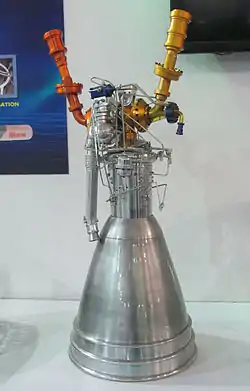Vikas (rocket engine)
The Vikas (a portmanteau from initials of VIKram Ambalal Sarabhai[5][6] ) is a family of liquid fuelled rocket engines conceptualized and designed by the Liquid Propulsion Systems Centre in the 1970s.[7][8] The design was based on the licensed version of the Viking engine with the chemical pressurisation system.[9] The early production Vikas engines used some imported French components which were later replaced by domestically produced equivalents.[10] It is used in the Polar Satellite Launch Vehicle (PSLV), Geosynchronous Satellite Launch Vehicle (GSLV) and LVM3 for space launch use.
 Model of the Vikas engine | |
| Country of origin | India |
|---|---|
| Designer |
|
| Manufacturer | Godrej & Boyce and MTAR Technologies[1] |
| Predecessor | Viking |
| Status | Active |
| Liquid-fuel engine | |
| Propellant | N2O4 / UDMH |
| Cycle | Gas generator |
| Performance | |
| Thrust | 850 kN[2] |
| Chamber pressure | 6.2 MPa (62 bar) [3][4] |
| Specific impulse, vacuum | 293 seconds (2.87 km/s)[3] |
| Specific impulse, sea-level | 262 seconds (2.57 km/s)[3] |
| Dimensions | |
| Length | 3.70 m (12.1 ft)(Vikas-4B) |
| Dry weight | 120 in (3,000 mm) |
| Used in | |
| 2nd stage of PSLV and GSLV Main stage L110 of LVM3 | |
Vikas engine is used to power the second stage of PSLV, boosters and second stage of GSLV Mark I and II and also the core stage of LVM3. The propellant loading for Vikas engine in PSLV, GSLV Mark I and II is 40 tons, while in LVM3 is 55 tons.
History
In 1974, Societe Europeenne de Propulsion agreed to transfer Viking engine technology in return for 100 man-years of engineering work from ISRO. The first engine built from the acquired technology was tested successfully in 1985 by Nambi Narayanan and his team at ISRO and named it Vikas.[11]
Technical details

The engine uses up about 40 metric tons of UDMH as fuel and Nitrogen tetroxide (N2O4) as oxidizer with a maximum thrust of 725 kN. An upgraded version of the engine has a chamber pressure of 58.5 bar as compared to 52.5 bar in the older version and produces a thrust of 800 kN. The engine is capable of gimballing.
For launches from 2018 a 6% increased thrust version of the Vikas engine was developed. It was demonstrated on 29 March 2018 in the GSAT 6A launch second stage. It will be used for the four Vikas engines first stage boosters on future missions.[12]
Variants
| Type | Nozzle
Diameter (m) |
Length
(m) |
Nozzle
Area Ratio |
Chamber
pressure (MPa) |
Fuel | Mix Rate | Flow rate
(t/sec) |
Thrust(kN) | Specific Impulse (Ns/kg) | Launcher Stages | ||
|---|---|---|---|---|---|---|---|---|---|---|---|---|
| Sea Level | Vacuum | Sea Level | Vacuum | |||||||||
| Booster/first stage | ||||||||||||
| Vikas-2 | ~1.00 | ~2.75 | 13.9 | 5.30 | UDMH / N2O4 | 1.86 | 0.2469 | 600.5 | 680.5 | 2432 | 2756 | GSLV Mk.I L40H Strapon |
| Vikas-2B | ~1.00 | ~2.75 | 13.9 | 5.30 | UH 25 / N2O4 | 1.87 | 0.2710 | 677.7 | 765.5 | 2501 | 2824 | GSLV Mk.II L40H Strapon |
| Vikas-X | ~1.80 | ~3.75 | UH 25 / N2O4 | 0.2805 | 756.5 | 839.0 | 2697 | 2991 | LVM3 L110 stage | |||
| Second stage | ||||||||||||
| Vikas-4 | ~1.50 | ~3.50 | 5.35 | UDMH / N2O4 | 1.86 | 0.2498 | - | 725.0 | 2903 | GSLV Mk.I GS2 stage, PSLV PS2 stage | ||
| Vikas-4B | ~1.80 | ~3.70 | 5.85 | UH 25 / N2O4 | 1.71 | 0.2716 | - | 804.5 | 2962 | GSLV Mk.II GS2 stage, PSLV PS2 stage | ||
| References:[13] | ||||||||||||
References
- "Manna from Mars ISRO's first mission to the red planet provides a fillip to its local component suppliers". Business Today. 8 December 2013. Retrieved 14 February 2014.
- India's VIKAS engines and its relationship to the European Viking engines Archived 2015-12-22 at the Wayback Machine Norbert Brügge, Germany 24 December 2014
- PSLV Launch Vehicle Information Space Flight 101 24 December 2014
- "With eye on lunar mission, ISRO to test high-thrust Vikas engine". Retrieved 21 May 2022.
- M Ramesh (18 December 2014). "Godrej Aerospace to make semi-cryogenic engines". The Hindu Business Line.
- Narayanan, Nambi; Ram, Arun (2018). Ready To Fire: How India and I Survived the ISRO Spy Case. Bloomsbury Publishing. p. 191. ISBN 978-93-86826-27-5.
- "ISRO tests Vikas engine". The Hindu. 3 December 2001. Archived from the original on 23 March 2014. Retrieved 11 December 2012.
- K.S. Jayaraman (2 August 2009). "Unsung hero of moon mission is sad but forgiving". Thaindian.com. IANS. Archived from the original on 10 January 2018. Retrieved 11 December 2012.
- Sutton, George Paul (2006). History of Liquid Propellant Rocket Engines. AIAA. p. 799. ISBN 9781563476495.
- Sutton, George Paul (2006). History of Liquid Propellant Rocket Engines. AIAA. p. 882. ISBN 9781563476495.
- Muthunayagam, A.E (10 December 2015). Rao, P.V. Manoranjan (ed.). From Fishing Hamlet to Red Planet: India's Space Journey. Harper Collins. p. 344. ISBN 978-93-5177-690-1.
- Clark, Stephen (29 March 2018). "India tests upgraded engine tech in successful communications satellite launch". Spaceflight Now. Retrieved 30 March 2018.
- Brügge, Norbert. "India's VIKAS engines and its relationship to the European Viking engines". B14643 Internet Presentation to Space Launch Vehicles. Norbert Brügge. Archived from the original on 22 December 2015. Retrieved 11 December 2015.
External links
- "L110 test to follow S200". SuperNova. January 4, 2010.
- "Class of 1974: Rocket science & reminiscences". India Today. IANS. 19 October 2015.

